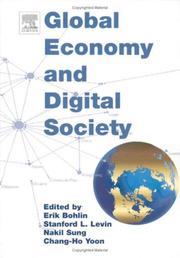| Listing 1 - 3 of 3 |
Sort by
|

ISBN: 0444513353 9786611027391 1281027391 0080547192 9780080547190 9780444513359 Year: 2004 Publisher: Amsterdam ; Boston : Elsevier,
Abstract | Keywords | Export | Availability | Bookmark
 Loading...
Loading...Choose an application
- Reference Manager
- EndNote
- RefWorks (Direct export to RefWorks)
The effects of Information and Communication Technologies (ICTs) on globalization, innovation, growth and productivity are immense. ICTs contribute to the globalization of production and capital markets by reducing the cost of information and communication. These technologies have certainly made it easier for multinationals and other companies to spread production facilities all over the world, to co-ordinate international marketing campaigns, and to ease collaboration in projects taking place on different continents. While the anti-globalization movement may claim otherwise, individuals and c
Digital communications - Congresses. --- Telecommunication - Technological innovations - Congresses. --- Telecommunication policy - Congresses. --- Telecommunication policy--Congresses. Telecommunication--Technological innovations--Congresses. Digital communications--Congresses. Globalization--Economic aspects--Congresses. --- Telecommunication policy --- Telecommunication --- Digital communications --- Globalization --- Business & Economics --- Transportation Economics --- Technological innovations --- Economic aspects --- Electric communication --- Mass communication --- Telecom --- Telecommunication industry --- Telecommunications --- Communication --- Information theory --- Telecommuting --- Global economy --- Digital society --- E-books
Book
ISBN: 0262012855 0262517280 128224048X 9786612240485 0262255065 9780262255066 9780262012850 9781282240483 9780262517287 6612240482 0262260549 Year: 2009 Publisher: Cambridge, Massachusetts [Piscataqay, New Jersey] MIT Press IEEE Xplore
Abstract | Keywords | Export | Availability | Bookmark
 Loading...
Loading...Choose an application
- Reference Manager
- EndNote
- RefWorks (Direct export to RefWorks)
Innovation in information and communication technology (ICT) fuels the growth of the global economy. This examination of ICT from a political economy perspective argues that innovation and economic growth require new approaches in global governance that will reconcile diverse interests and enable competition to flourish.
Electronic books. -- local. --- Information technology -- Economic aspects. --- Information technology -- Technological innovations. --- Technological innovations -- Economic aspects. --- Telecommunication -- Technological innovations. --- Technological innovations --- Information technology --- Telecommunication --- Economic History --- Business & Economics --- Economic aspects --- Economic aspects. --- Technological innovations. --- IT (Information technology) --- Technology --- Telematics --- Information superhighway --- Knowledge management --- E-books --- INFORMATION SCIENCE/Communications & Telecommunications --- INFORMATION SCIENCE/Technology & Policy
Book
ISBN: 3642316344 3642316352 128391042X Year: 2013 Publisher: New York : Springer,
Abstract | Keywords | Export | Availability | Bookmark
 Loading...
Loading...Choose an application
- Reference Manager
- EndNote
- RefWorks (Direct export to RefWorks)
The classification of services in the digital economy proves critical for doing business, but it appears to be a particularly complex regulatory matter that is based upon a manifold set of issues. In the context of the General Agreement on Trade in Services (GATS), when the services classification scheme was drafted in the early 1990s, convergence processes had not unfolded yet and the internet was still in its infancy and not a reality in daily life. Therefore, policy makers are now struggling with the problem of regulating trade in electronic services and are in search of a future-oriented solution for classifying them in multilateral and preferential trade agreements.
Business enterprises -- Technological innovations -- Case studies. --- Electronic commerce -- Law and legislation. --- Electronic commerce. --- High technology industries -- Management. --- Information technology -- Economic aspects. --- Telecommunication -- Technological innovations. --- Law, Politics & Government --- Law, General & Comparative --- Information services. --- Data collection services --- Information brokers --- Information centers --- Information science service organizations --- Information service providers --- Providers of information services --- Law. --- Private international law. --- Conflict of laws. --- International law. --- Comparative law. --- Private International Law, International & Foreign Law, Comparative Law. --- Information retrieval --- Information science --- Documentation --- Research --- Choice of law --- Conflict of laws --- Intermunicipal law --- International law, Private --- International private law --- Private international law --- Law --- Legal polycentricity --- Comparative jurisprudence --- Comparative legislation --- Jurisprudence, Comparative --- Law, Comparative --- Legislation, Comparative --- Law of nations --- Nations, Law of --- Public international law --- Acts, Legislative --- Enactments, Legislative --- Laws (Statutes) --- Legislative acts --- Legislative enactments --- Jurisprudence --- Legislation --- Civil law
| Listing 1 - 3 of 3 |
Sort by
|

 Search
Search Feedback
Feedback About UniCat
About UniCat  Help
Help News
News